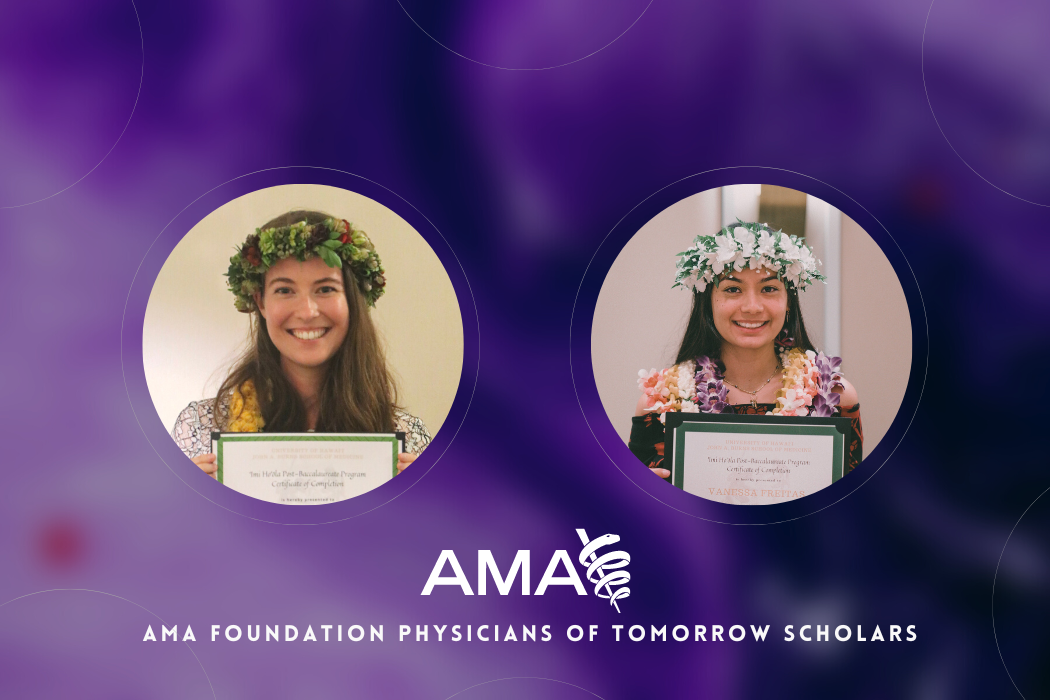
Having grown up in Kona on Hawaiʻi Island, Sarah Albrecht has watched family members and friends travel to extreme lengths to receive medical care throughout the course of her life.
“I remember spending my childhood summers at my grandma’s house on Oʻahu watching my mother recover from a total knee replacement surgery and times she was away for months because of additional orthopedic surgeries that were only performed on Oʻahu,” said Albrecht, now a medical student at the John A. Burns School of Medicine (JABSOM).
When she, herself, experienced difficulty breathing due to her severe pectus excavatum disorder, more commonly known as a sunken chest, Albrecht said she had no opportunities to have it corrected because such specialized physicians were nonexistent in her Kona community.
“Packing my belongings for a doctor’s appointment or waiting months to see a visiting physician were the realities I faced living in an underserved community,” Albrecht said. “I want to become a doctor to help alleviate the barriers that are faced in rural underserved areas.”
Albrecht is one of two recipients of a fund recently created by the American Medical Association Foundation (AMAF) to support Native Hawaiian students pursuing an MD degree at JABSOM who have successfully completed the ʻImi Hoʻōla Post-Baccalaureate Program.
The AMA Foundation Physicians of Tomorrow Scholarship Program aims to address the shortage of healthcare providers in underserved areas while providing integral financial assistance to aspiring physicians.
For Albrecht, this scholarship will be tremendous in offsetting the cost of applying to and visiting residency programs during her fourth year of medical school. She looks forward to being able to fully explore career options that will allow her to focus on becoming a doctor that can best serve her community.
“The financial barrier that comes with applying to college and medical school has always been a challenge. I only applied to a handful of colleges (undergraduate university) because that was all I could afford. As for medical school, I only applied to JABSOM because I felt it was the best fit for me,” Albrecht said.
One of the major criteria for the scholarship is having successfully completed the UH ʻImi Hoʻōla Post-Baccalaureate Program, a rigorous pipeline program designed to help minority students or those from underserved areas attain their dreams of becoming physicians. Although difficult, the background in science foundation acquired and the time management and study skills developed because of ʻImi Hoʻōla lead its graduates to successfully matriculate into JABSOM, where they remain at the top of their class.
Medical student Vanessa Freitas, also an AMA Foundation Scholarship recipient, says that as an adult she made it a priority to reconnect with her cultural identity as a Native Hawaiian, whether that be through taking ‘Ōlelo Hawaiʻi classes, learning about Hawaiian medicinal herbs, volunteering at vaccine clinics, removing invasive plant species or simply making time to speak to youth at pathways to medicine workshops.
“I want to give back and make a difference, doing all I can to not only learn about my Native Hawaiian culture, but to do actual work in the community,” said Freitas. “And ʻImi Hoʻōla prepared me so well for the first year of medical school that I was able to continue to dedicate a substantial amount of time to volunteering.”
Aside from preparing her for medical school, what also stood out to Freitas were the relationships cultivated during her time as an ʻImi.
“I feel the relationships between the students and faculty is what sets JABSOM apart from other medical schools. Aside from my family at home, the NHCOE (Native Hawaiian Center of Excellence) faculty have been my number one supporters. Their support is unparalleled,” said Freitas.
Both Albrecht and Freitas extend their deepest gratitude and mahalo to the AMA Foundation for their support.
“This scholarship means so much to me and to my ʻohana. Their kōkua (help) has further allowed me to attend medical school here in Hawaiʻi. With their support, I continue on my journey to becoming a kauka (doctor). It is my kuleana (responsibility) to aloha ‘āina (land) and restore the health of our lāhui (Hawaiian nation),” said Freitas.